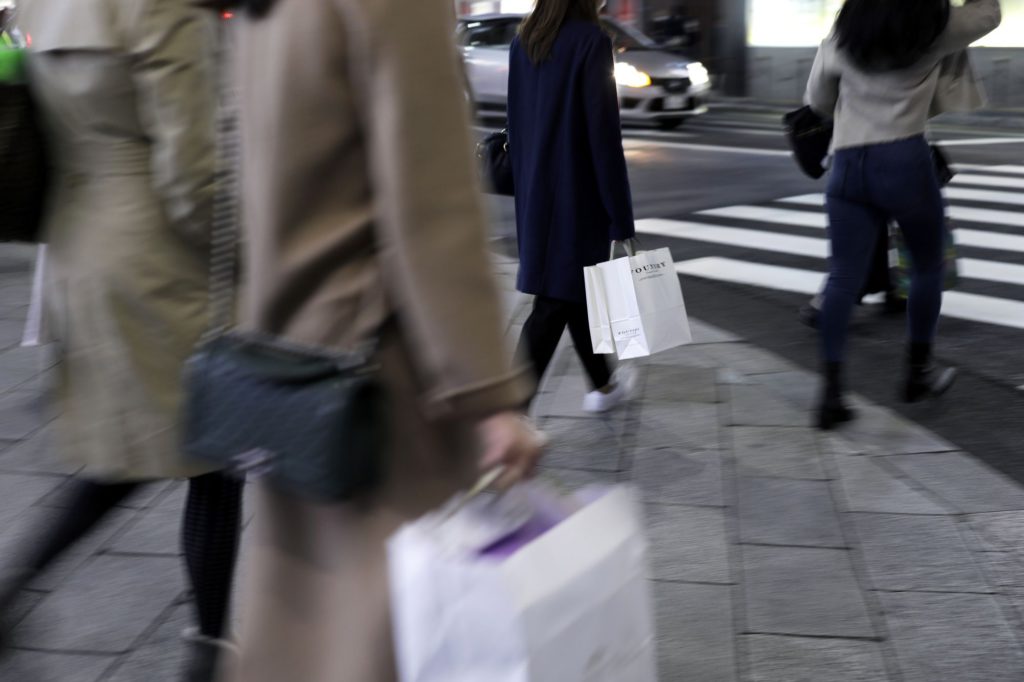(Bloomberg) — Gains in Japan’s core consumer prices accelerated in November and would have hit the central bank’s 2% target without the impact of slashed mobile phone fees.
Consumer prices, excluding those for fresh food, rose 0.5% compared with a year earlier, driven by higher energy prices, the ministry of internal affairs reported.
While Japan’s inflation rate continues to lag far behind its global peers, the underlying price trend is being obscured by distortions caused by government policies such as the drive to lower phone charges. Cellphone fees were down 54% from a year earlier.
Stripping out the phone factor, core inflation is about 2%, according to a Bloomberg calculation. Inflation has only reached the Bank of Japan’s 2% target during the year following a sales tax hike in 2014, despite Governor Haruhiko Kuroda’s large-scale monetary easing program launched in 2013.
Even though the data suggests Japan has more inflation than the headline figure indicates, economists don’t see any change in the BOJ’s main interest rate settings on the horizon.
“So far energy costs alone have been pushing up inflation,” said Mari Iwashita, chief market economist at Daiwa Securities Co. “Going forward, the key is how much it will spread to other areas like food products. Some companies have scope to pass costs on to consumers while others don’t.”
With the headline figure still far from the BOJ’s goal, Kuroda has continued to argue that the central bank is nowhere near a normalization of its stimulus measures for prices. That stance contrasts with moves by the Federal Reserve and other major central banks to pare back pandemic stimulus measures seen as unnecessarily fueling inflationary pressures.
Despite Kuroda’s insistence that inflation still remains weak in Japan, soaring commodity costs around the world are impacting households and businesses in Japan, mainly through the impact of the higher energy costs.
The report showed fuel and electricity costs rose 16% from a year earlier, causing pain for a wide swathe of the population and businesses.
With the higher energy prices, companies are facing the biggest cost pressure in four decades, though most are still trying to absorb the upward pressure without hiking their own prices.
While the vast majority of Japanese citizens have mobile phones, only a small portion of them have changed service plans to take advantage of sharply lower fees. The overall impact suggests a squeeze on household pocketbooks that Prime Minister Fumio Kishida may be keen to avoid with an election coming in the summer.
The premier’s economic stimulus measures approved last month include help for people and businesses to deal with higher energy prices.
What Bloomberg Economics Says…
“The jump in Japan’s core inflation (excluding fresh food) in November puts a squeeze on purchasing power and could slow a recovery in spending that’s been driven by pent-up demand.”
–Yuki Masujima, economist
To read the full report, click here.
With the BOJ set to keep stimulus in place while its peers wind back their measures, pressure on the yen to stay relatively weak will likely continue.
“There’s a risk that a weaker yen could hit consumers with more expensive durable goods on the back of higher import prices,” Iwashita said. “That’s a negative effect from a weaker currency that the BOJ doesn’t want to see.”
(Adds economist comments and Bloomberg calculation)
More stories like this are available on bloomberg.com
©2021 Bloomberg L.P.











